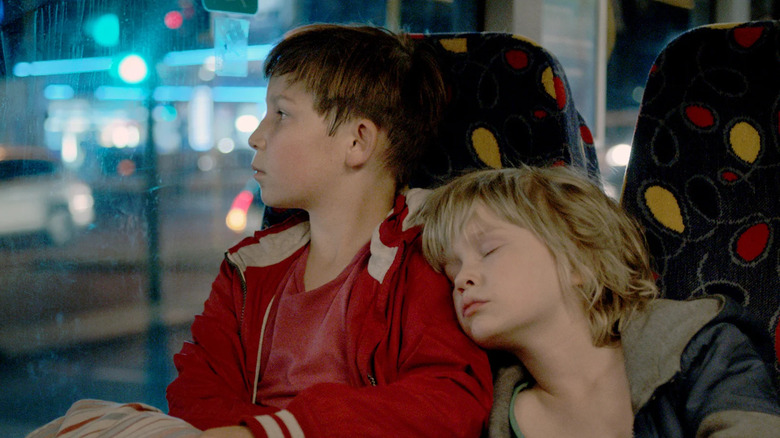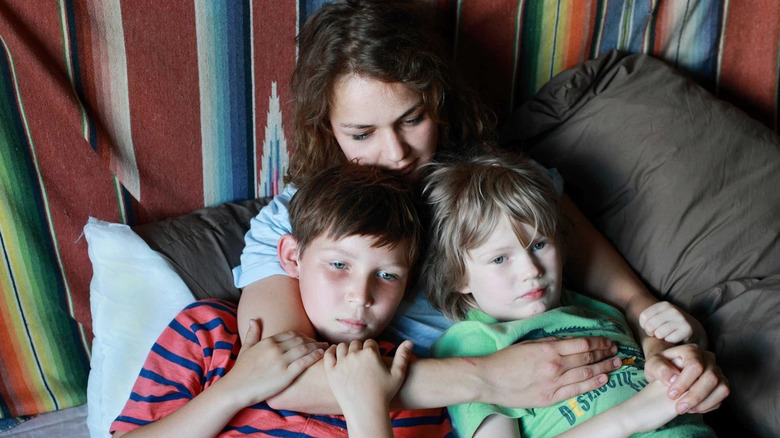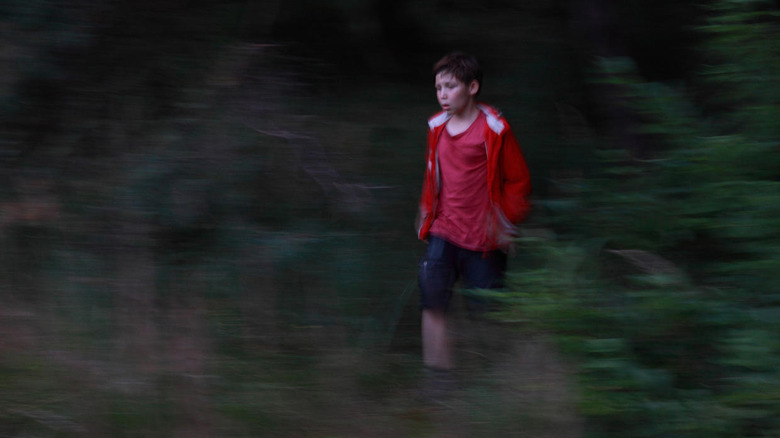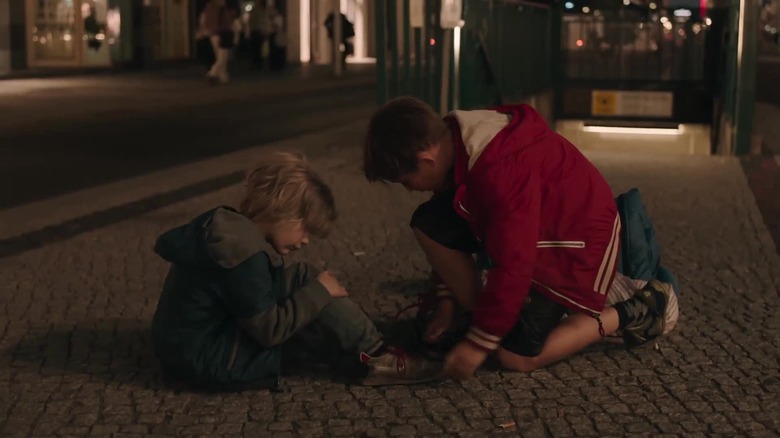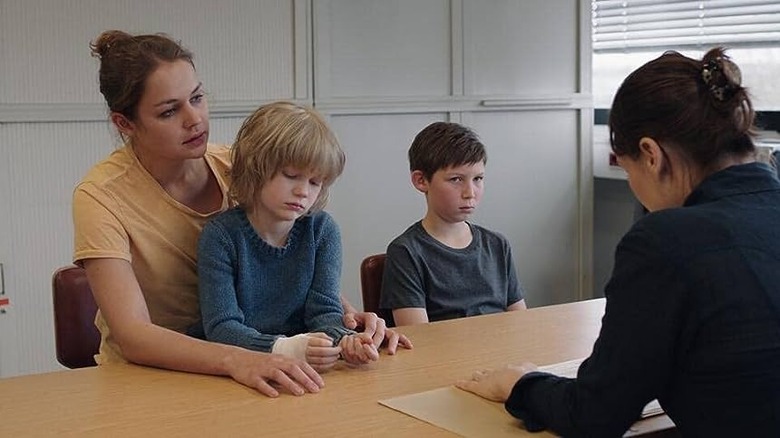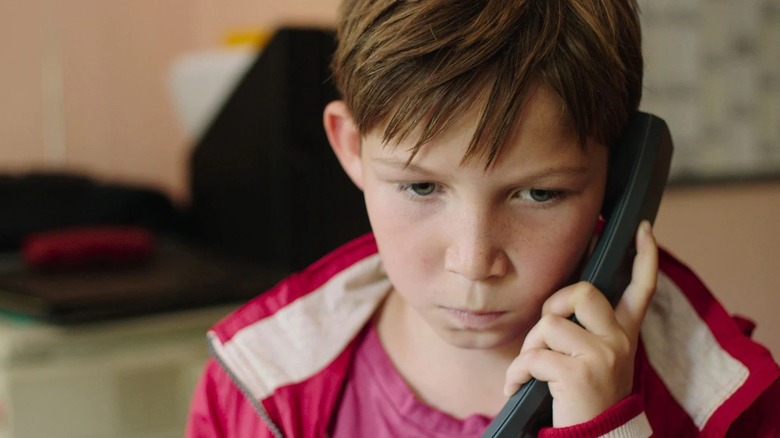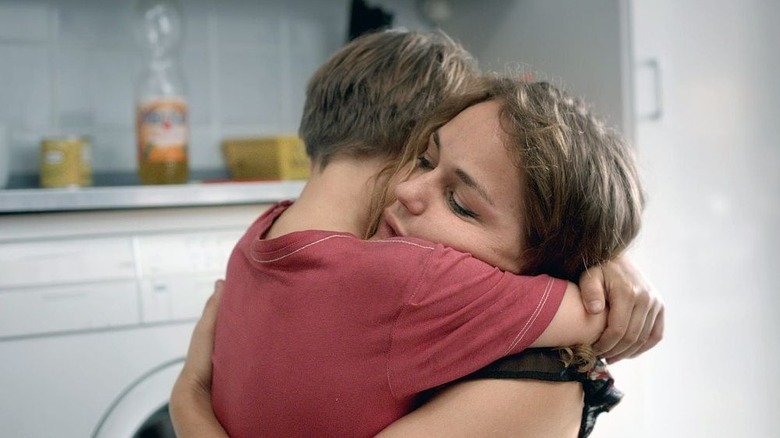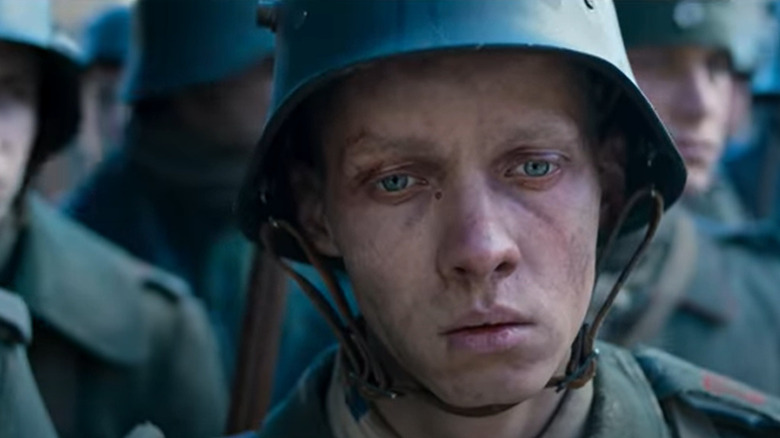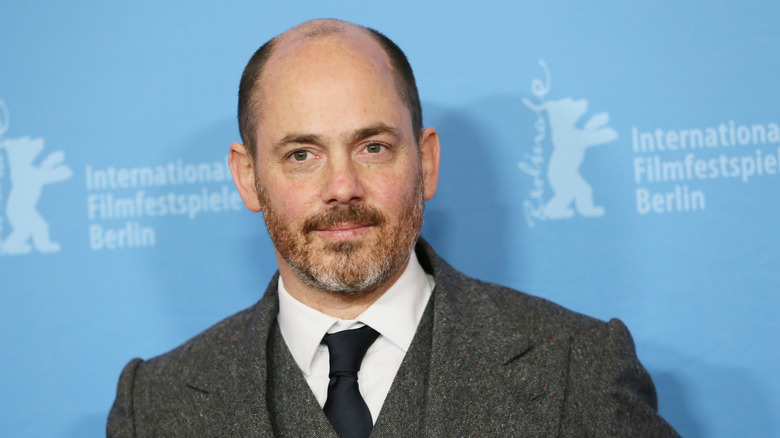The Ending Of Jack Explained
With the rise of streaming and the recent success of international films at the Academy Awards, movie fans across the globe have more choices than ever. But for every polished masterpiece like Bong Joon-ho's 2019 hit "Parasite" and S. S. Rajamouli's 2022 epic smash "RRR," there are hundreds of smaller but no less fascinating films out there waiting to be discovered. One such film is 2014's "Jack," which has its own connection to the recent trend of international films finding viewers and acclaim with American audiences.
Streaming services can provide a venue for global films old and new, and social media and the wider internet can provide a platform for discussion about them. Combined, our modern movie consumption practices mean that a low-profile film like "Jack" can become part of the cultural conversation years after its release. "Jack" might be harder to find than most (at least with subtitles), but it's getting buzz regardless and it's a rewarding watch for anyone who seeks it out.
This impressive debut feature from a filmmaker on the rise is competently made and thought provoking, but it isn't necessarily enjoyable. The film tells the harrowing story of a prepubescent boy stuck between an unstable home and the unfeeling state. With a sparse script, an abrupt ending, and many open-to-interpretation moments throughout, "Jack" leaves viewers feeling just as unsettled as its main character, somewhere between despair and hope. This is what happens to Jack (and his brother Manuel) and what it all means.
What you have to remember about the plot of Jack
When "Jack" begins, it's clear that the titular 10-year-old boy (Ivo Pietzcker) is quite accustomed to taking care of himself and his five-year-old brother, Manuel (Georg Arms). There's evidence that their mother, Sanna (Luise Heyer), isn't the best parent. Sanna is immodest around her children with her lovers, the family appears to live on the precipice of abject poverty, and she leaves them unattended more often than is wise. But just how unfit she is remains an open question for much of the film, just as it does for Jack. So when Manuel scalds himself in a hot bath while she's away and the state assumes custody of the older but not the younger boy, the audience is meant to question the decision. Sanna protests that he's her kid, but she doesn't put up much of a fight.
Jack is moved into foster care. The home to which he's assigned is much more affluent, with two kind and well-intentioned parents and enough food to go around, but here, Jack's lost in a sea of troubled kids. He befriends one boy whose father has passed away. That's how viewers learn that Jack never met his dad. However, the other kids exclude and bully Jack. He desperately wants to see Sanna and Manuel again. Both Sanna and his foster mother give him the impression that day will come (Sanna says they'll visit in about five weeks or around the holidays) but it doesn't, which leaves Jack feeling hopeless about his situation.
Why Jack runs
Because of Sanna's negligence, Jack is often in danger. The film hints at this when Jack and Manuel try to retrieve a boat that's floated too far out into the middle of a body of water. Jack isn't a strong swimmer and there isn't an adult around, should the situation turn dire. From the government's and the foster parents' perspective, he's much better off now, but a disturbing repeat of the lakeshore scene occurs involving Jack's worst bully. The kid, who's already beaten and harassed Jack on previous occasions, invites him to go swimming. Once they're in the water, he very nearly drowns Jack. Our panicked protagonist catches his breath, only to see the bully chuck a pair of binoculars beyond where he can reach them — the same binoculars that belonged to the deceased father of Jack's one friend.
Jack tries to get them back, but can't, and when on shore with his attacker again, he clobbers him in the side of the head with a large tree branch. The impact knocks the boy out, and Jack makes a run for it, presumably because he's afraid he'll get in trouble for stealing the binoculars and hurting (or possibly killing) the kid. He has a change of heart and returns to the scene of the crime, only to find that the bully is gone. Jack hears him and the others in the distance and takes off. At first, he's only trying to evade capture, but eventually, he calls his mom and informs her that he's coming home.
What happens at the end of Jack
The latter half of "Jack" sees the 10-year-old trekking across Berlin and avoiding the police while trying to find his mother and brother. The first time he shows up at his old apartment, the authorities and his foster mom are there looking for him. The second time, one of Sanna's male acquaintances is squatting in her place and hands over Manuel without question. At this point, "Jack" becomes something of a mystery as to Sanna's whereabouts and well-being. Jack calls but always gets voicemail. He leaves notes outside her door. He visits adults who have come in and out of his life. Jack goes looking for her at a rave and tells his little brother to wait outside, but Manuel wanders in anyway and Sanna isn't there.
Without a guardian or money, Jack and Manuel are forced to sleep in cars and survive on stolen condiment packets. More than once, the older brother has to convince the younger one to keep going. Jack steals a pair of binoculars (to replace the ones he borrowed and lost) from an electronics store at the mall. When he realizes he left Manuel behind, he rushes back and is almost arrested. More desperate than ever, the two pay a visit to Jonas, who works at a rental car company. He buys them a meal, but when they ask for his help finding Sanna, he tries to turn them in, eventually blurting out the harsh truth: their mother has purposely abandoned them.
Where do the characters end up?
After countless calls, notes, and visits, one day Sanna is simply home. The boys are ecstatic to see her, and she acts happy to see them, though she's far more excited about the ring on her finger. They spend one normal day together, but the next morning, Jack checks on all the notes he left her, proclaiming his love, and finds that she hadn't read any of them. Jack realizes in this moment that Sanna wasn't looking for them. If he stays, at best he'll be largely responsible for himself and Manuel. At worst, she'll abandon them again. He packs a duffel bag and wakes his brother.
They take public transportation to a front door that's framed by a chain link fence. Jack rings the doorbell. When a voice asks who it is, he answers, "Jack," twice. That's where the film cuts to black. What becomes of Jack is somewhat ambiguous, but because we saw a similar fence at the foster home earlier, we can guess that Jack has returned to the facility the state placed him in, this time with his brother in tow. Whether he and Manuel will be allowed to stay there is uncertain, and we know that Jack isn't particularly happy or safe in that home. As for Sanna, we're left to imagine what life choices she's made that have led her to this point. Will she get married? Will she turn her life around? The downward trajectory she's been on suggests the answer is no.
What does the ending of Jack mean?
"Jack" is a modest but emotionally wrenching story told from the perspective of a neglected child. The film's commentary on the social safety nets that are supposed to support such children is pretty overt, but a number of metaphorical visual motifs run throughout "Jack" and add even more depth and complexity to this already gripping narrative.
Co-writer and director Edward Berger doesn't provide the audience with easy answers about what should happen to Jack and Manuel, and he's equally critical of Sanna's dysfunction and the state's inadequate solutions. Why Sanna abandons her children (poverty, addiction, mental illness, bad relationships, etc.) is intentionally vague because it's Jack's story and that's how he understands her.
Twice in the film, Jack and Manuel wrestle and bite at each other like dog or wolf pups. This is meant to show that, because of their mother's absence, they're basically feral. But it also reinforces that they're young and learning the ways of the world. There's also the symbolism of the water, showing that Jack is in over his head. The unanswered phone calls and unread notes show, literally and figuratively, that Jack can't get through to Sanna. The binoculars have hidden meaning as well. When we meet Jack, he can only process what's going on in the moment. He can't look at his life from a distance and conceive of how bad things really are. He's holding the binoculars when he ultimately makes the decision to leave Sanna and take Manuel with him.
How was Jack received?
"Jack" was mostly well-reviewed when it arrived in 2014, an impressive feat for a low-budget, debut feature film starring a first-time child actor. Ivo Pietzcker and Georg Arms earned praise for their naturalistic performances, as did Edward Berger for the brutal realism of the piece, though some critics felt the characters and their backstories were slightly underdeveloped. Audiences seemed to agree: "Jack" currently has a Rotten Tomatoes audience score of 82 percent, and an average rating of 3.5 stars on Letterboxd.
"Jack" had its premiere at the 64th Berlin Film Festival, where it was in the official competition. Greta Gerwig, Christoph Waltz, Michel Gondry, and Tony Leung were on the jury that year, and films such as Richard Linklater's "Boyhood" and Wes Anderson's "The Grand Budapest Hotel" (which were both nominated for best picture) were screened. "Jack" didn't win any festival awards, but it was one of eight movies shortlisted to potentially represent Germany at the Academy Awards. That honor went to "Labyrinth of Lies" instead, but Berger still succeeded in making a name for himself in the international film industry. Prior to "Jack," he'd worked in television.
Is there a sequel?
Edward Berger may not have gotten to compete for an Academy Award with "Jack," but eight years later, he won Germany the Oscar for best international feature with 2022's "All Quiet on the Western Front." The retelling of Erich Maria Remarque's seminal 1928 novel of the same name took home three other Academy Awards as well, for production design, score, and cinematography. It had been nominated for nine in total, including best picture. "All Quiet on the Western Front" premiered at the 2022 Toronto International Film Festival to strong word of mouth but little fanfare. Over the course of the fall and winter, it slowly gained steam, eventually becoming an Oscar frontrunner, along with the movie that nabbed the biggest prize, "Everything Everywhere All at Once."
As for "Jack," it's a standalone film that effectively gave Edward Berger his start. There is no sequel, nor are there plans for one, so we'll never know what happened after Jack rang that doorbell. Considering the subject matter, it's probably better that way. "Jack" is a statement about the precariousness of some children's lives, and its open-ended, slightly upbeat, slightly tragic final scene best serves that purpose.
After "Jack," Berger returned to TV to direct episodes of the series "Deutschland 83," "The Terror," and "Patrick Melrose," before continuing with his film career. He wrote and directed 2019's "All My Loving," before hitting it big with "All Quiet on the Western Front." Next up for Berger is a project called "Conclave," which is in post-production.
What has Edward Berger said about Jack?
"Jack" follows in the independent and German cinema traditions of stark but understated realism, so it should be no surprise that "Jack" has its roots in a true story.
Edward Berger grew up loving movies but not knowing much about them. He took his first film class at 14 and would eventually study at New York University. After graduation, he struggled to complete a script on his own that he could turn into a successful film. His creative breakthrough came thanks to his role as a father. Berger told Deadline that he noticed a kid walking home from school one day. His son told him, "Oh, that's Jack. He's in my class. On Friday nights, he goes to stay with his mom, and on Sunday nights, he goes back to the children's home." Berger couldn't stop thinking about the boy, felt guilty for wallowing in self-pity about his writer's block, and got to work on what would become "Jack."
His debut effort taught him how to get an audience to focus on and feel for the main character. "The camera was really only on the boy's face," he told The Talks, "because I didn't want to give the audience any choice but to identify with him." It's a technique he also used with Paul in "All Quiet on the Western Front." Berger's recipe for a great film is simple: "All it takes is a good script and a clear, strong sense of style."
